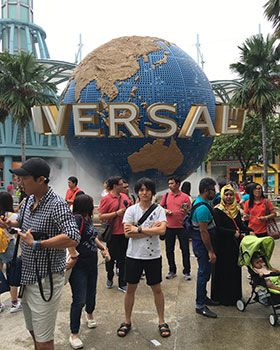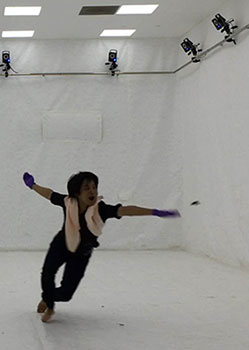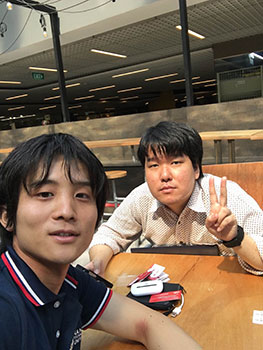Content of the study program
I visited Nanyang Technological University (NTU) to conducted research on artificial wings mounted on beetles in the laboratory of Associate Professor Hirotaka Sato. My efforts aimed at improving the flying performance and diversifying the flying characteristics of a beetle by replacing the beetle’s wings with artificial ones. A beetle’s flight, namely the ability to start and stop flying as well as to turn during flight, has gradually become controllable electronically. A beetle’s wing can be roughly classified into two parts: 1) wing veins that maintain the wing’s shape and 2) the membrane that catches air. The first step of this research is to replace the membrane part with an artificial one because realizing an artificial membrane is considered relatively easy. After the replacement, the flight speed and acceleration rate of the beetle during free flight were measured in a room equipped with a three-dimensional motion capture system. The measured flight speed and acceleration rate were compared with the pre-replacement data to identify the changes in the flying characteristics. My research focused on the development of beetle’s artificial wings with greater flying characteristics.
Study results
After replacing 70% of the wing membrane with an artificial one composed of Parylene, the beetle successfully flew. However, trying to fly a beetle after cutting out its natural wing membrane and not applying a Parylene membrane caused the beetle to crash. These results show that a Parylene membrane effectively works in beetle’s flight. I conducted an experiment where the beetle’s wing membrane was replaced with Parylene in nine samples. For every sample, the increase in the flight speed upon replacement was within ±15%. The average increase was around 0%, indicating that a Parylene membrane has a similar performance as natural wings. This opportunity was mainly intended for research activities, but my English language skills also improved during my visit, especially when communicating with local researchers. Several weeks after arriving in Singapore, I was not only able to communicate using simple phrases, but also could participate in conversations about our research, which required specialized knowledge, even though my language skills were not perfect.
My experience abroad
During this visit, I had opportunities to get to know the culture of Singapore, which can only be understood by spending a significant amount of time there. The people at NTU were very kind; they offered to help me when I became disoriented on the campus. As part of the laboratory, I meet many wonderful people and made new friends with whom I shared a meal or participated in a group activity. Additionally, the host family that I stayed with introduced me to the area, including local customs and tasty foods. Apart from the research activities, communicating in English provided good practice for working in an international environment.

Influence on my future career
Although this visit has not changed my desired career path, it will help me achieve my career goals. Because the research activities centered on the laboratory goals, I learned how to communicate effectively, especially with my supervisors. When studying abroad, it is difficult to have a face-to-face conservation or share my experimental results with my supervisors back in Japan in due to the physical distance. In such a situation, I think the ability to precisely communicate the actual conditions and propose solutions to real problems is very useful. Thus, this experience reiterated the importance of effective communication whether working at a research institute, a university, or a private company. It has provided an excellent opportunity to improve such abilities.
Other comments
I think it is great that such study abroad programs exist. I am extremely grateful for the support. To show my gratitude, I worked hard on my research not only during my visit but also continue to do so upon returning to Japan.




